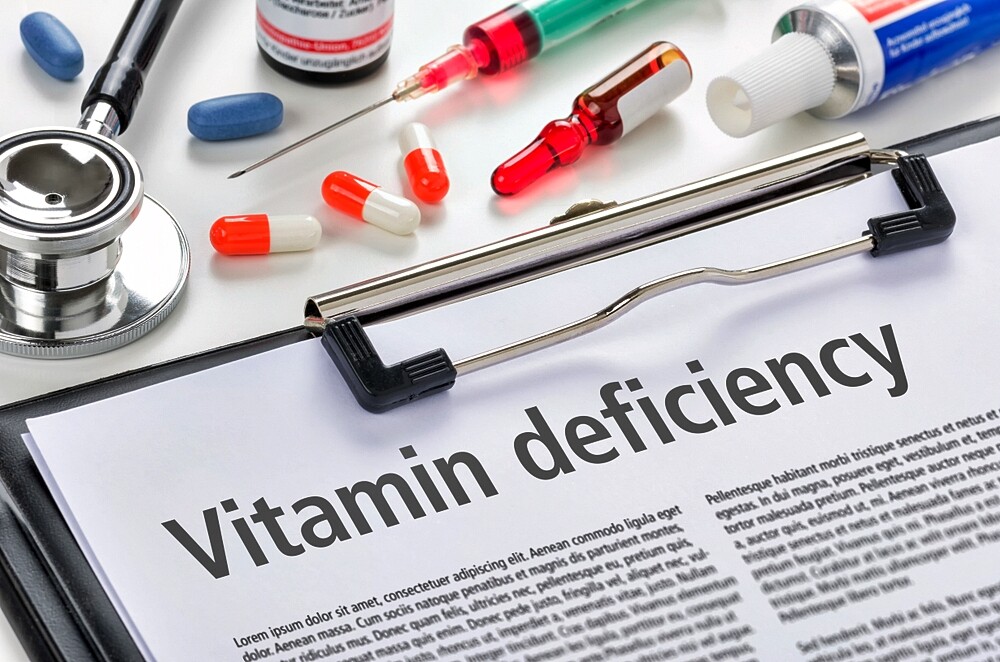Vitamin deficiency due to insufficient or wrong nutrition is not only apparent in the shape of the figure – it is also visible in the face. You should pay attention to this!
1. Swollen eyes
Everyone knows swollen eyes – for example after crying or sleeping for a long time. Having swollen eyes from time to time is therefore completely normal. However, if they develop into a permanent condition, this should give you food for thought. Swollen eyes can be a sign of iodine deficiency. In order to counteract this, it is logically advisable to rely more on foods containing iodine.
What helps?
- Milk products (yoghurt, mozzarella, milk, etc.)
- Cranberries,
- Algae
- Seafood
2. Pale skin
Even pale skin is not necessarily an immediate sign of a vitamin deficiency. Having a “pale” day because of a bad night is generally not a problem. However, just like swollen eyes, paleness can also be a sign of a vitamin deficiency if it occurs regularly.
A vitamin B12 deficiency is a more common cause. Of course, suitable foods can also help to prevent this. Whether you suffer from a vitamin B12 deficiency can be clarified by a simple blood test at your doctor.
What helps?
- Beef
- Cottage cheese,
- Liver
- Oysters
- Fish such as herring, mackerel or trout
3. Dry hair
You wash your hair with the best shampoo, care for it regularly with cures, and yet it is dry and fissy? The reason for this can be a lack of biotin. This usually manifests itself as dry hair and brittle fingernails. And even in this case the right diet can help. But beware: Biotin is a water-soluble vitamin, so vegetables should not be cooked in too much water.
What helps?
- Eggs
- Tomatoes
- Pulses (e.g. peas or soybeans)
- Oatmeal
4. Pale lips
Pale skin and especially pale lips can indicate an iron deficiency. It can take some time before an iron deficiency becomes apparent. First the body uses up all its reserves, only then do the first symptoms appear like a pale complexion.
Even with this vitamin deficiency, a change in diet is recommended. In particular meat such as pork liver contains a lot of iron. However, there are also enough iron-containing vegetables, so that veggies also get their money’s worth.
What helps?
- Liverwurst,
- Corned beef,
- Oysters
- Lenses
- Chanterelles
- White beans
5. Sensitive gums
Rapidly bleeding gums or loose teeth also indicate a vitamin deficiency, more precisely a vitamin C deficiency. Vitamin C is essential for building and maintaining connective tissue, as it contributes to collagen formation. But not only that – vitamin C is a vital vitamin that strengthens our immune system and which our body cannot produce itself.
This makes it all the more important to ingest ascorbic acid, as vitamin C is also called, through food. Citrus fruits in particular are said to have a high vitamin C content. However, there are numerous other foods that contain considerably more vitamin C.
What helps?
- Cabbage vegetables (broccoli, Brussels sprouts, kale, etc.)
- Spinach
- Currants
- Peppers
Do I need vitamin supplements?
In principle, a healthy and varied diet can provide us with an adequate supply of vitamins and minerals – therefore, vitamin supplements are actually unnecessary. However, if you have a severe vitamin deficiency, you can decide in consultation with your doctor whether supplementation with vitamin preparations is sensible.
The ABC of vitamins: A brief overview of a vitamin deficiency and its consequences
Vitamin A
The fat-soluble vitamin A is among other things elementary for the visual process, growth and the mucous membranes. Accordingly, a deficiency can lead to dry skin, night blindness, impaired vision or an infection of the respiratory tract.
B Vitamins
The group of B vitamins includes a large number of vitamins. All these vitamins must be supplied to the body continuously through food, as the body cannot store them permanently. The consequences of deficiency symptoms are as varied as the B vitamins themselves. From loss of appetite to nervousness to fatigue, anything can occur. In order to avoid symptoms of this kind, it is helpful to pay attention to a balanced diet.
By the way, the so-called folic acid (vitamin B9) plays a special role in vitamin deficiency. It is involved in various metabolic processes in the body, and a deficiency can lead to anaemia, among other things. Pregnant women and women who want to have children are recommended to take more folic acid, as a folic acid deficiency can lead to malformations in the child.
Vitamin C
As mentioned above, the body needs ascorbic acid for the formation of connective tissue and cartilage. Vitamin C is also indispensable for the absorption of iron. In addition, wounds or fractures heal much more slowly if we have too little vitamin C in us. Another symptom of vitamin deficiency is a torn corner of the mouth.
Vitamin D
Vitamin D is the only vitamin that our body can produce itself – using sunlight. We don’t even need the height of summer for this; even daylight in winter can stimulate production.
A vitamin deficiency can mean that the intestines can no longer absorb some vital substances. In addition, muscle weakness or joint and bone pain are symptoms that can occur due to a deficiency. In infants, a vitamin deficiency also leads to rickets. Rickets can damage the bone structure and thus ensure that the child’s head remains soft.
Vitamin E
A deficiency of vitamin E, also called tocopherols, can reduce performance and fertility, as well as lead to increased nervousness. The cell protection vitamin also protects the body cells from harmful influences, which is why it is increasingly used in skin creams. But vitamin E is also contained in foods such as nuts and vegetable oils.

